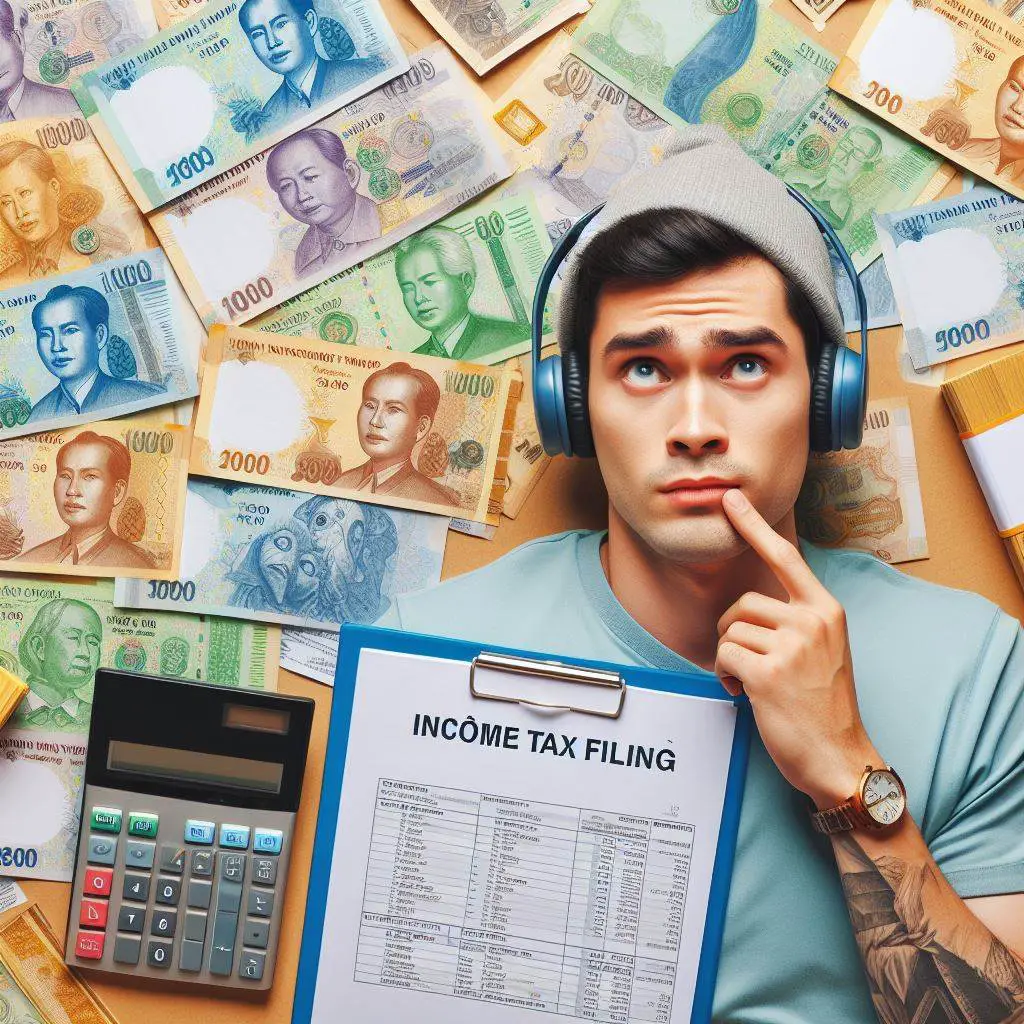|
Tax season is here. In Vietnam, taxes must be filed before the end of April. As a foreigner, you might be wondering how to file a tax return and what the regulations are. Luckily Vietnam has made it easy by creating an online tax filing system that you can complete from your computer, although you do still have to physically send some forms to the tax office. Let us answer some common questions about tax filing that might come up.
Preface: The following is Q+A for tax year 2023 only, based on information provided on Vietnam's Ministry of Finance website for your reference only. Personal income tax can be a complicated issue; for specific answers regarding your tax situation please contact the Vietnam tax office: +84 (0) 2439-712-555. The ultimate decision for tax payable is up to the discretion of the Vietnam tax office.
Q: When should I file Taxes? A: For individuals, the deadline is the last day of April. Expatriates departing Vietnam must complete and submit a tax finalization return, which is due within 45 days of the departure date. Q: When are Vietnam tax payments due? For individuals, the deadline is the last day of April. Expatriates departing Vietnam must complete and submit a tax finalization return, which is due within 45 days of the departure date. Q: What makes me eligible for paying Vietnam taxes (or what makes me a tax resident)? A: As a foreigner, you become a Vietnam tax resident if you stay in Vietnam longer than 183 days in a calendar year, or you have an apartment rental contract longer than 183 days, or you have a resident permit valid for longer than 183 days. If you worked in Vietnam and stayed less than 183 days, you need to pay taxes on your Vietnam-based salary, and you will pay a fixed rate of 20% income tax (your company may have deducted this from your salary already). Q: How do I count the days I stayed in Vietnam? A: It's a good idea to keep track of the number of days you have been in Vietnam via the stamps on your passport. Q: What is the income tax rate?/ How much is Vietnam tax? A: The income tax rate for non-residents is 20% (you can get a tax refund if you pay 20% taxes and then become a tax resident). The 2023 tax rate for residents (staying over 183 days in Vietnam) is as follows (source: Vietnam Ministry of Finance): Vietnam 2023 Progressive Tax Rate Table: Monthly taxable income (million VND) and Tax Rates: 0 to 5 million VND: 5% 5 to 10 million VND: 10% 10 to 18 million VND: 15% 18 to 32 million VND: 20% 32 to 52 million VND: 25% 52 to 80 million VND: 30% More than 80 million VND: 35% If you make more than 32 million Vietnamese dollars per year, it might be best to keep the number of days in Vietnam down to 183 or below if you can to be applicable for a flat tax rate of 20%. Q: Are there tax exemptions? A: Yes, there is a VND, 11,000,000 per month exemption for the taxpayer, and a VND 4,400,000 per month deduction for each of the taxpayer's qualifying dependents. Spouses or the parents of the taxpayers who do not have jobs or have income not exceeding VND 1 million (US$43) are also qualified dependents. Q: What other special deductions are there? A: Donations to approved charities, human aid, and education funds, and compulsory insurance contributions. Q: Is there a foreign tax credit in Vietnam? A: Yes, Vietnam offers a foreign tax credit for foreign tax paid on Vietnam-source income. Q: What tax benefits are available for foreign professionals? A: Certain benefits may receive concessional treatment based on their nature and the method of provision. These benefits include: Accommodation: Taxable housing allowance and payments for utilities and accompanied services are limited to 15% of total taxable income, excluding actual rental fees and utility expenses. School fees: Only school fees paid directly from employer(s) to school(s) for children attending school in Vietnam, from kindergarten to high school level, are eligible. Home leave flights: Only one round-trip air ticket per year for the expatriate is non-taxable, supported by relevant documents. Non-taxable meal allowance paid in cash is capped at VND730,000. Non-taxable uniform allowance paid in cash is capped at VND5,000,000. Compulsory insurance contributions as per the regulations of the expatriate's home country/jurisdiction. It is advisable to seek specific advice in advance to ensure the maximization of planning opportunities and compliance with qualification criteria. Certain other non-wage benefits may qualify for exemption from Personal Income Tax. These include one-time relocation benefits, school fees for children studying in Vietnam, insurance without accumulated premiums, business trip allowances, phone allowances, annual round-trip air tickets, travel allowances from home to the workplace and vice versa, unspecified benefits, benefits provided by the employer for the wedding and funeral of the employee and the employees’ family members, overtime allowances, and training costs. To be eligible for tax exemption, both the employer and the employee must prepare the necessary supporting documents in accordance with Personal Income Tax regulations. These documents, such as agreements, labor contracts, and valid invoices following Vietnamese regulations, should be provided to the tax authority when requested during future tax audits. Q: What is the amount for tax filing exemption? If my salary is low enough do I not have to file taxes in Vietnam? A: There is a VND, 11,000,000 per month exemption for the taxpayer, and a VND 4,400,000 per month deduction for each of the taxpayer's qualifying dependents. Q: How do I compute tax in Vietnam?/ How do I compute a tax refund in Vietnam?/ How do I calculate Vietnam income tax in Vietnam? A: Take your gross net salary and subtract applicable deductions. After this, you can see which tax bracket your wage falls into, and multiply this by the rate of the tax bracket and you will arrive at the amount of tax owed. Q: Is there an online tax calculator I can use? A: Yes, you can use the free online calculator here (should only be used for reference): https://vietnamteachingjobs.com/personal-income-tax-calculator/ Q: How do I file taxes in Vietnam? A: Taxpayers have the option to request their employers to complete the finalization of Personal Income Tax (PIT) and submit it to the tax authorities on their behalf. Nevertheless, individuals who prefer to file separately can submit it to the local managing tax office situated where their employer is located. Q: How do I pay my taxes? A: You can pay by cash or by bank wire transfer. Q: How do I get my Vietnam tax refund? A: You can get your refund by check or direct deposit. The later you send your documents the later you get your refund. Q: When will I get my Vietnam tax refund? A: No one can say for sure. This depends on how early you submitted your tax refund, how complicated your refund is, and the arbitrary decision-making of the tax officer assigned to you. Q: How do I get a Vietnam VAT tax refund as a foreigner? A: Besides the benefits described above, foreign visitors in Vietnam are also applicable for VAT refunds. You can check out many discount deals for accommodation, tours, shopping, and transportation for foreigners in Taiwan that include VAT deductions on Klook here or on KKday here. Q: What is the withholding tax rate in Vietnam? A: This depends on the nature of the payment and whether or not you stay over 183 days in Vietnam (and thus become a tax resident). For non-residents, the tax rate is a flat 20%. Q: What is the sales tax/VAT/indirect tax rate in Vietnam? A: 5-10%. Q: What is the hotel tax rate in Vietnam? A: 10%. Q: What is the corporate income tax rate in Vietnam? A: 20% Q: Does Vietnam tax foreign income? A: Yes if you are a tax resident. No if you are a not a tax resident. If you are a resident in Vietnam, you are liable to pay income tax on all your worldwide income. Q: How do I file US Taxes if I am an American citizen or a green card holder overseas? A: Please see our guide on filing taxes as an American Expat living overseas here. Q: Who Should I go to if I have a question while filing my income tax return on my own? A: For specific questions, please call the Vietnam tax office: +84 (0) 2439-712-555 Q: Are there any other tax benefits for foreigners in Vietnam? A: Besides the benefits described above, foreign visitors in Vietnam are also applicable for VAT refunds. You can check out many discount deals for accommodation, tours, shopping, and transportation for foreigners in Vietnam that include VAT deductions on Klook here or on KKday here. Feel free to comment or ask any reasonable general questions below that a free online blog can answer (otherwise, please just call the tax office), and please like and share! -Larry
0 Comments
Your comment will be posted after it is approved.
Leave a Reply. |
AuthorWe are the same Foreigners in Taiwan, but just sharing blogs about other countries for Expats that are not in Taiwan. For global expats. Archives
May 2024
Categories
All
|



 RSS Feed
RSS Feed
